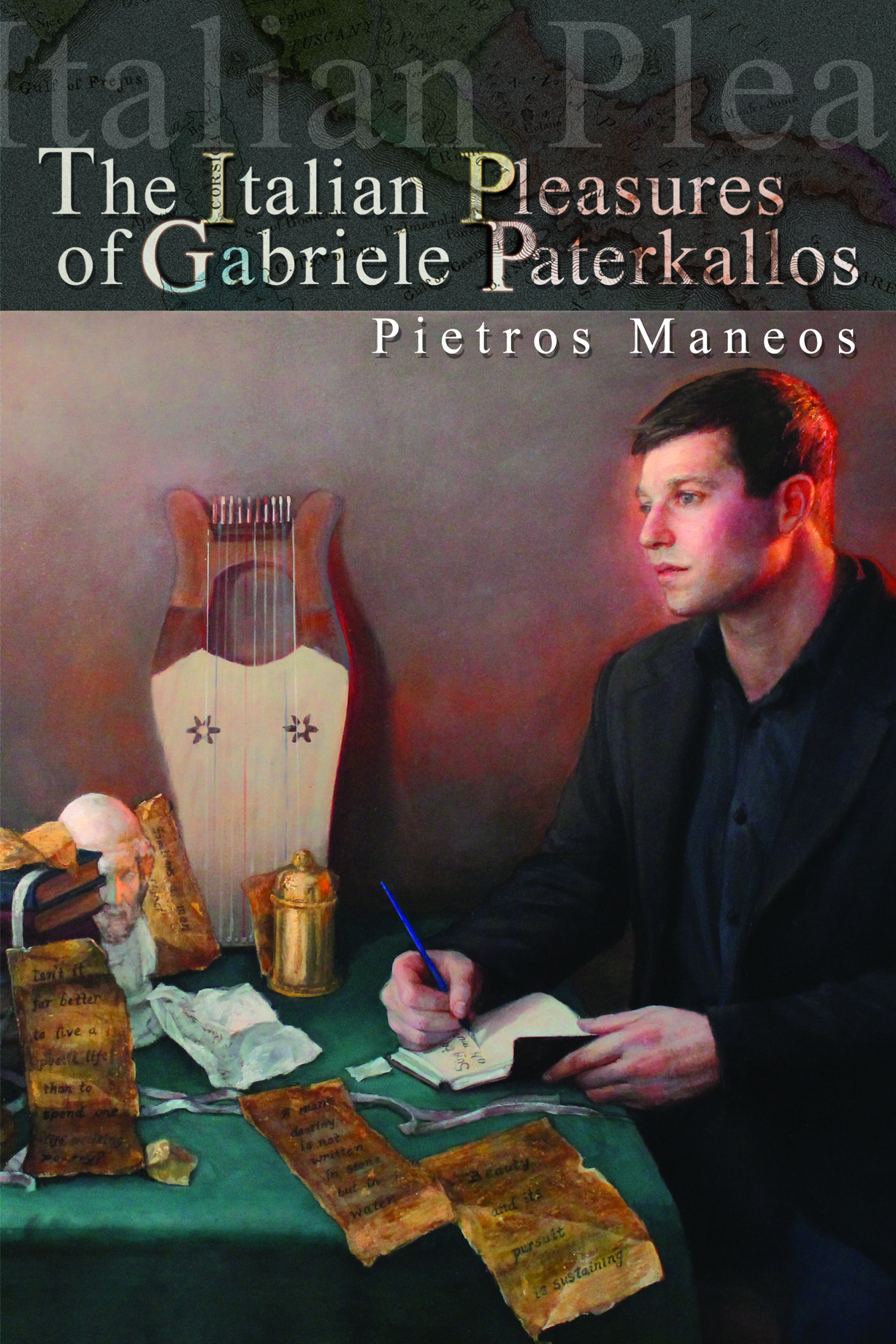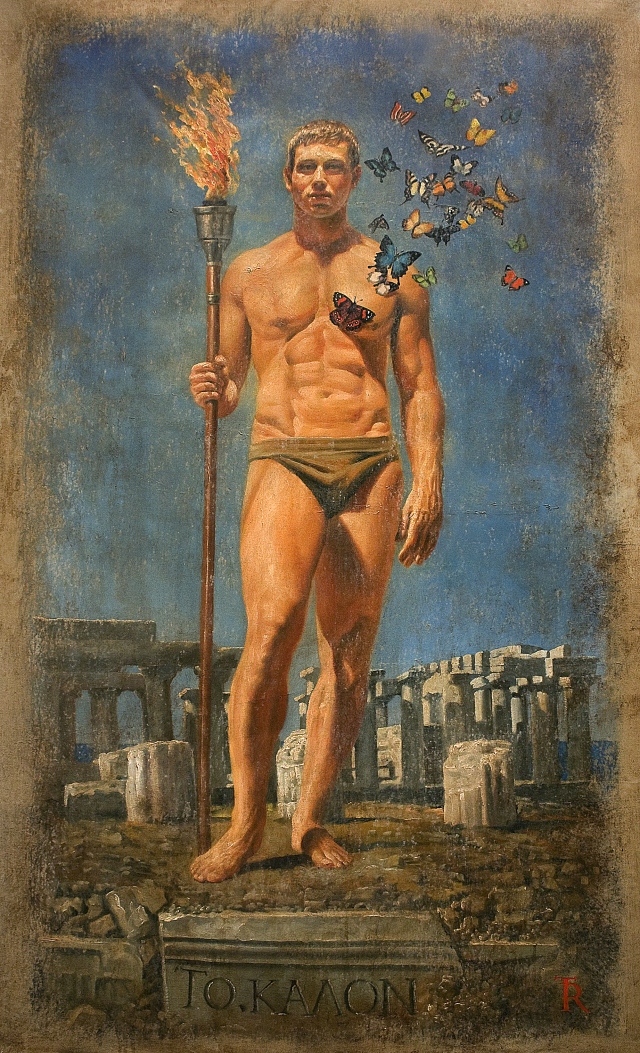The epistolary novella, The Italian Pleasures of Gabriele Paterkallos, details the illicit letters of the young, Byronic poet -- Gabriele Paterkallos -- to his friend in Paris, the self-exiled American novelist, Odysseus Pane. Gabriele is traveling throughout Italy while writing to Odysseus, so many letters read as something of an Italian travelogue, as if Frances Mayes had a tempestuous, brooding son. Indeed, certain letters could be construed as a paean, or a love letter, to the timeless beauty of Italy. For example, Gabriele notes in one letter, "The train ride from Florence to Rome was as beautiful as a fable peopled with poppies and princesses." In a literary age dominated by irony, despair, and cynicism, Gabriele is an avowed Romantic: passionate, mercurial, and emotional. He is an outcast and an outlaw, standing apart from and against his Age. Gabriele is to be despised as much as adored.
 Gabriela Dellosso's 'The Poet'
Gabriela Dellosso's 'The Poet'
The genesis of the novella was a series of letters exchanged with the author, Roman Payne, the clear model for the character, Odysseus Pane. Since Roman sleeps with a copy of The Odyssey tucked under his pillow and considers Homer's epic poem to be the pinnacle of western literature, choosing his name was axiomatic. Roman and I developed an immediate artistic kinship in our ensuing correspondence, discussing literature, aesthetics, philosophy, art history and ancient Greek history. It was as if I discovered a long lost brother: a fellow Romantic Aesthete also wandering aimlessly in a Post-Modern reality. As our letters progressed, it dawned on me that it would be an interesting project to create a novella based upon the epistolary interaction between two young writers, one in Rome, and one in Paris, as they formulated their ideas.
The composition of the novella was unique, to say the least; for every morning, I cut off a few branches of freshly-blooming bougainvillea so as to garland my brow in floral beauty reminiscent of a classical poet. Additionally, the entire novella was written to the glorious music of the Cretan lyra, and most often to the lovely songs of far-famed Achilleas Dramountanis. This was done not only to pay homage to my artistic ancestors, Homer and Sappho, who also wrote (though one should say 'sung') exclusively to the lyre, but moreover to enhance the musicality and overall beauty of the prose -- to fill every line with the roses of Arcady.
Cretan lyra player Achilleas Dramountanis
Listening to the lyra allowed me to ascend into a state of controlled madness, as if Dionysus were dancing to the disciplined instructions of Apollo; this sublime condition of Dionysian anoesis enabled lines such as those that follow to develop effortlessly: "Tonight the moon looks like a hammock of hammered gold brushed with ashen silver (40)" and "it shone like a bed of beryl bathed in Elysian light - like the bronzed armor of strong-armed Hector - like wild wisps of silver floating in a sun-whipped ether." It should be noted that this descriptive style of prose is positioned in direct opposition to the minimalism favored by many Moderns such as Bret Easton Ellis and Raymond Carver, and their legions of acolytes; this is not accidental, but a conscious repudiation of the ascendant literary mores. And to this point, Gabriele exclaims to Odysseus in one of the letters: "History is not a nightmare from which I am trying to awaken, but rather, a glorious tale which I wish to be cast in." an explicit rebuke to Joyce's far-renowned maxim, "History is a nightmare from which I am trying to awake" an apothegm encapsulating the depressive world-view of High Modernism.
Another motif that further evinces his renunciation of modernity is his continued repetition of the expression, "Oh, the Pleasure! The Pleasure!", which he often bellows in the midst of his innumerable sexual liaisons as well as during his pastoral reveries. The informed reader should immediately associate Gabriele's maxim with Joseph Conrad's Heart of Darkness where Conrad's protagonist, Mr. Kurtz, utters the now famous "The Horror! The Horror!" One could reasonably assert that the 20th-century ethos, in both the literary and visual arts, was defined by the incessant articulation of 'the horror' of existence -- an immersion in existential ennui. Beckett's Waiting for Godot and Eliot's The Waste Land are prime exemplars of this phenomenon; in fact, Eliot originally chose Kurtz's despairing words as the epigraph for The Waste Land before Pound convinced him to select a quotation culled from Petronius' Satyricon, which ends with "I want to die." Gabriele has too much of a heroic, Homeric Soul to condescend to the orthodox pessimism promulgated by the lionized mandarins. He is a man who does not wish to die, who is not 'waiting for death,' but rather is craving more life, more experience, more sensation; and truly, he desires to live a thousand lives, so as to savor every single sensation of beauty, passion, and ecstasy. Gabriele's sentiment here is the quintessence of Romanticism.
One thing that I learned, among many, as I worked upon the novella is that there are others who also oppose the prevailing tenets of modernity with the same defiant fervor as my hero, Gabriele. The nascent rise of Classical Realism in the visual arts is illustrative of the pendulum steadily swinging back into the rarefied realm of beauty, away from both the occult frigidity of Modernism and the snarky sneer of Post-Modernism. While vast tracts of the cognoscenti have been seduced by the risible sophistry of Jerry Saltz's following statement, there are others who do value the pursuit of beauty. Saltz said, "All great contemporary artists, schooled or not, are essentially self-taught and are de-skilling like crazy. I don't look for skill in art... skill has nothing to do with technical proficiency... I'm interested in people who rethink skill, who redefine or reimagine it: an engineer, say, who builds rockets from rocks." Gabriele stands with a man like John Keats, a man who "loved the principle of beauty in all things," not with this Jerry Saltz who bows obediently at the altar of originality. While Saltz and his minions fumble with their inept rockets (or is it rocks?), Gabriele dances furiously under the rosy-fingered Roman moon.
 Tomasz Rut's 'To Kalon'
Tomasz Rut's 'To Kalon'
Over the course of the past few years, I have developed numerous friendships with painters -- Classical Realists and others -- who work from a similar aesthetic sensibility to my own. And just last year, I collaborated with Tomasz Rut for a painting titled "To Kalon" ("The Beautiful" in ancient Greek.) So, for the cover image of the novella, I figured that it would be apropos to unite with a personage who possessed a similar aesthetic inclination. Gabriela Gonzalez Dellosso, represented by the Eleanor Ettinger Gallery in New York City, was an obvious choice. She had long been an admirer of my poetry, so it was a perfect fit. Gabriela actually incorporated individual lines from the novella within the painting, which she titled "The Poet." The painting is presently displayed at the esteemed Albemarle Gallery in London as part of their American Figurative Exhibition, which runs from May 31 to June 23. So, if you happen to find yourself in London over the next few weeks, do go see it.
Though I anticipate that the novella will have a very limited commercial appeal, I do think that it will help usher in a new age of literature: a literature defined by the ardent pursuit of beauty, truth, and emotion. And if this does not come to pass, it is a Romantic thought, nonetheless.